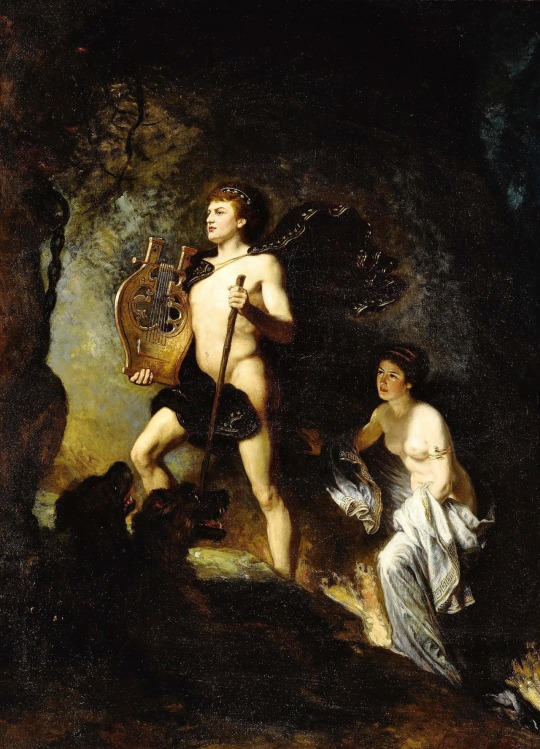#emil neide
Text
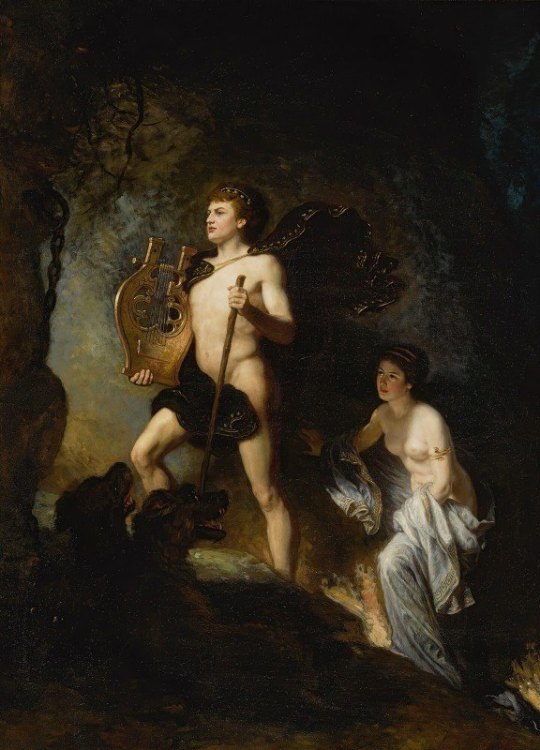
Orpheus And Eurydice (1876) by Emil Neide.
#art#aesthetic#painting#artwork#art history#dark academia#19th century#mythology#greek mythology#dark aesthetic#romantic academia#chaotic academia#dark art#romanticism#greek gods#paintings#oil painting#classical art#orpheus and eurydice#emil neide
1K notes
·
View notes
Photo
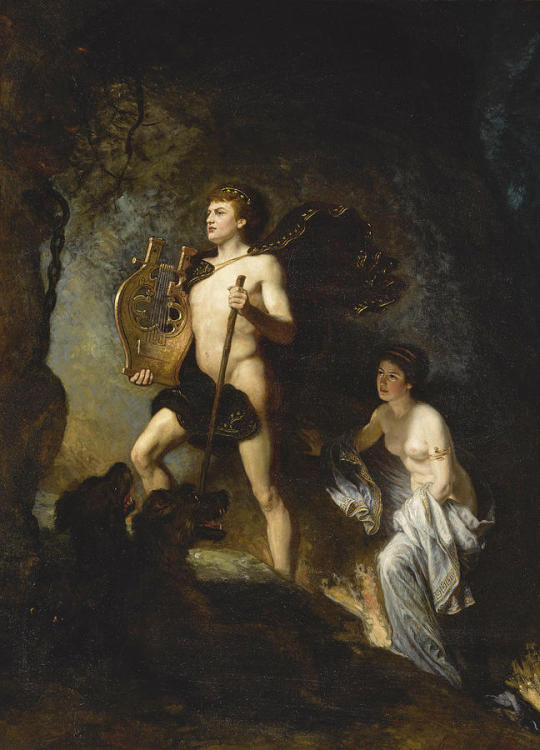
Orpheus and Eurydice by Emil Neide (1876)
#emil neide#art#paintings#fine art#19th century#19th century art#academism#academicism#academic art#painting#german art#german artist#mythology#greek mythology#orpheus#eurydice#cerberus#underworld#classic art
2K notes
·
View notes
Text
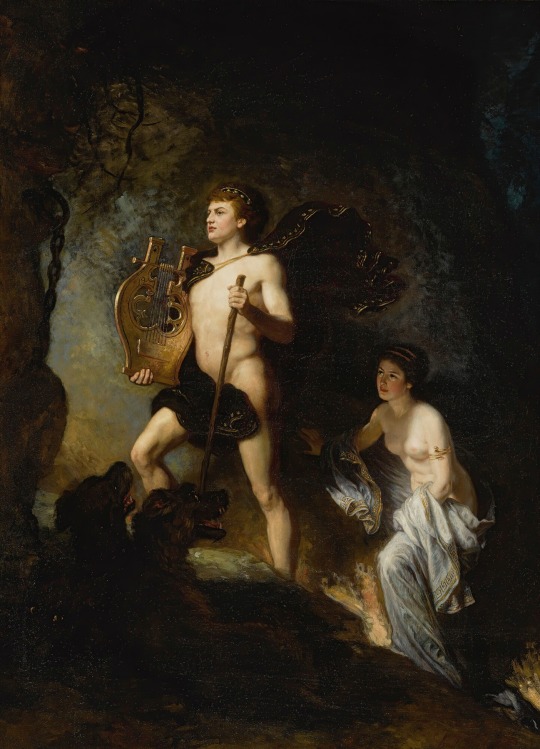
Emil Neide (German, 1843–1908) - Orpheus And Eurydice
152 notes
·
View notes
Photo
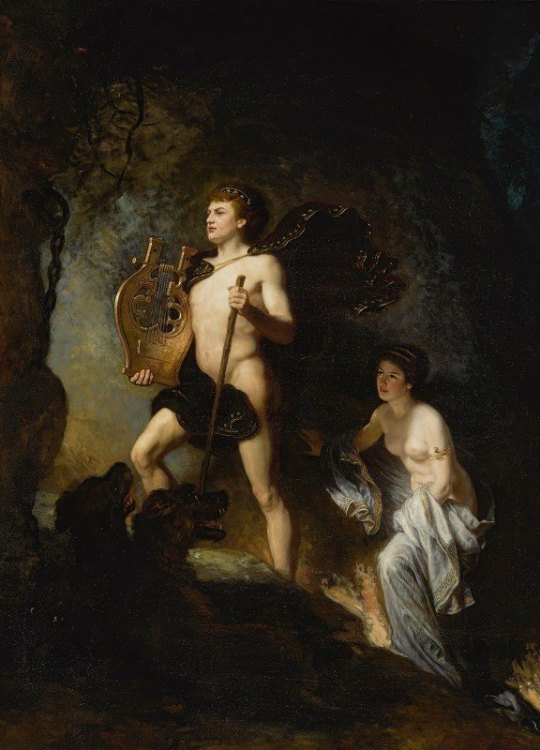
Orpheus And Eurydice, 1876, Emil Neide (1843-1908)
#Emil Neide#mythological painting#orpheus#orpheus and eurydice#greek mythology#greek gods#Dark Aesthetic#Aesthetic#german painter
75 notes
·
View notes
Text

© Emil Neide orphée et euridyce
13 notes
·
View notes
Photo
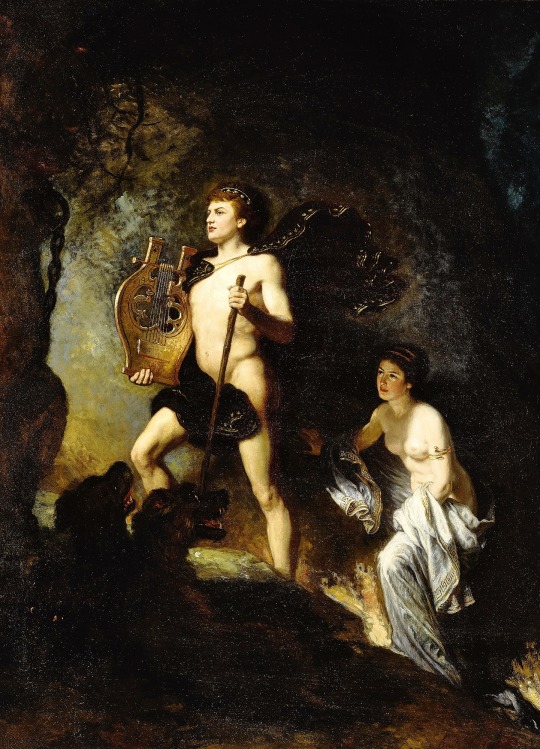
Orpheus and Eurydice. Emil Neide German 1843-1908. oil/canvas. http://hadrian6.tumblr.com
163 notes
·
View notes
Text

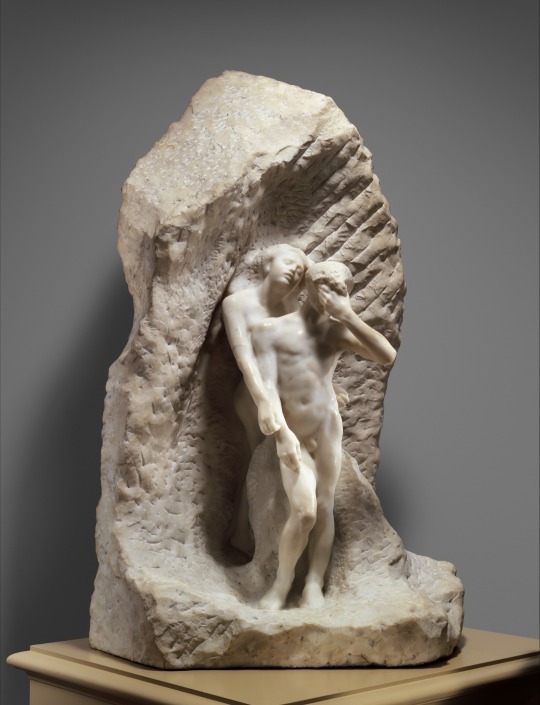
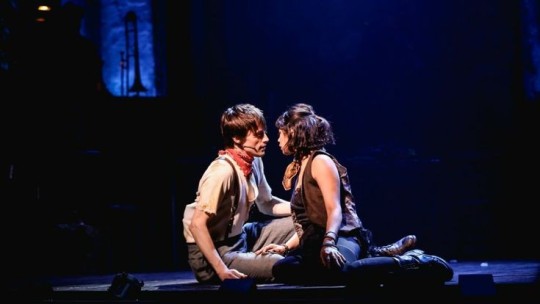
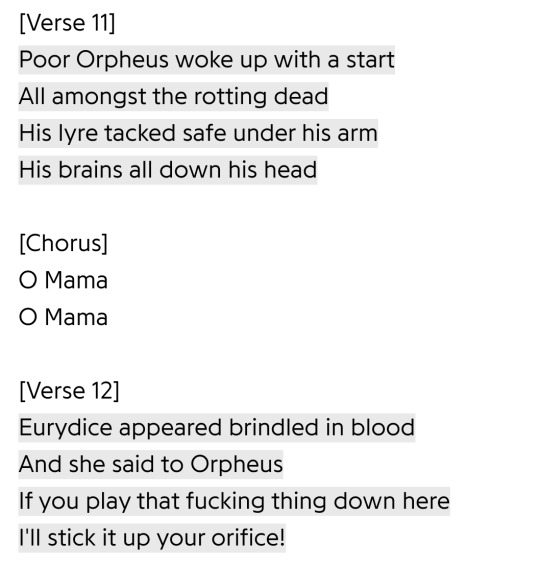
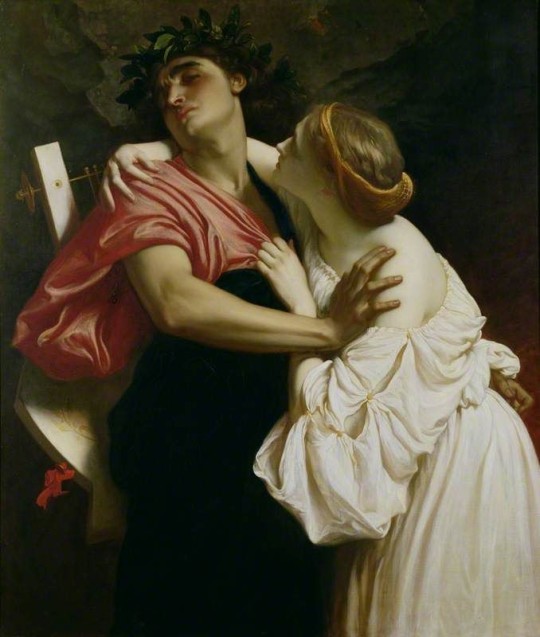

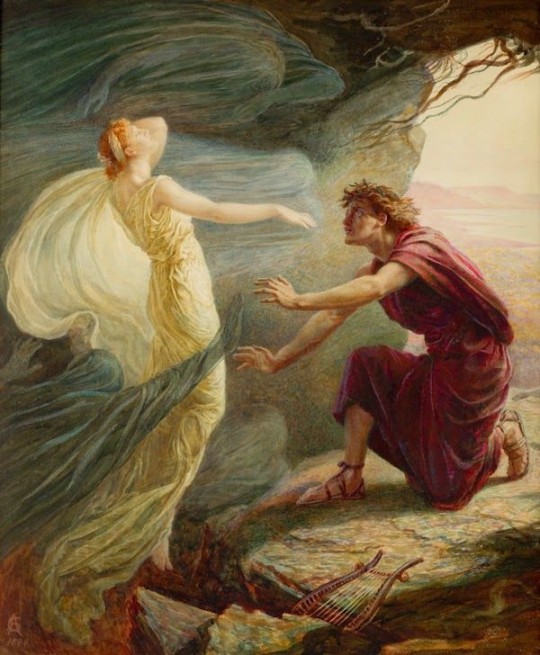
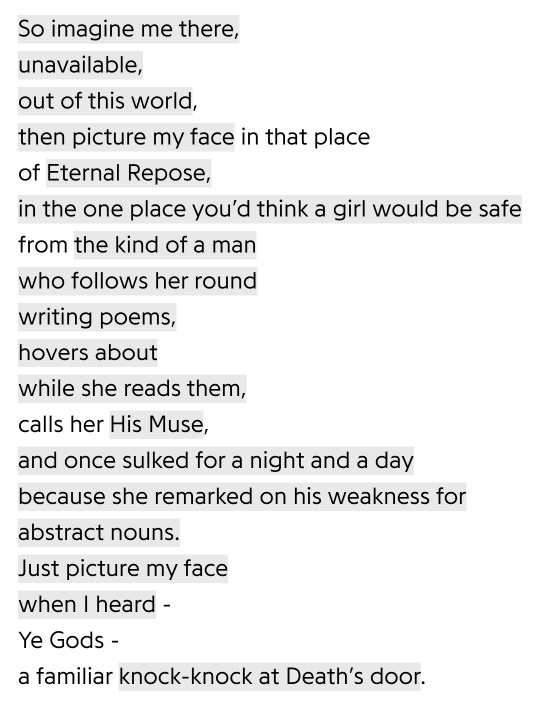

Orpheus and Eurydice
Auguste Rodin. 1893 / Portrait of a Lady on Fire, 2019 / Hadestown on Broadway,2019 / Painting / Nick Cave & The Bad Seeds; The Lyre of Orpheus / Frederic Leighton. 1864 / Hozier; Talk / Nicolas Poussin. 1650 / Carol Ann Duffy; Eurydice / Emil Neide
367 notes
·
View notes
Text
The mythology series [Jonsa] ~ Orpheus and Eurydice reversal ft. Drogo and Dany
Ciao my Jonsa folks, and lurkers and lovely anons and everyone around! As I've spoken numerous times (thank you to all the lovely anons that actually forwarded their opinions and considerations because you were fundamental for this meta!) I realized quite of sudden that another possible mythological parallel for our Jonsa had completely gone over my head without my noticing, and decided to try and contextualize it in our asoiaf mythology metas.
The myth is the one and only of Orpheus and Eurydice, the heartbreaking story of an unconventional hero (Orpheus) and his unconventional methods to try and save his beloved wife (Eurydice), and whilst Orpheus fails (wether by choice, or because overcome by feelings) these two tropes of the lost spouse and of failing to save a loved one are most prominent in Sansa's arc, and Sansa seems, to me, as if she fits the bill of the gender reversal Orpheus.
As always, the premise remains unchanged. Myth and legend as well as history are layered matters, with layers and concepts often beyond my comprehension as I am in no way an expert (I only collect evidence and research the matter and try to draw my own conclusions). So yes, we do it for fun, yes any input by anyone who knows better or simply has a different opinion or interpretation is welcome and appreciated.
Now, on the seatbelts, we're in for another ride!
Orpheus and Eurydice, the unconventional hero and his lost spouse, Ovid ~ the North remembers/if I look back I am lost, asoiaf, GRRM
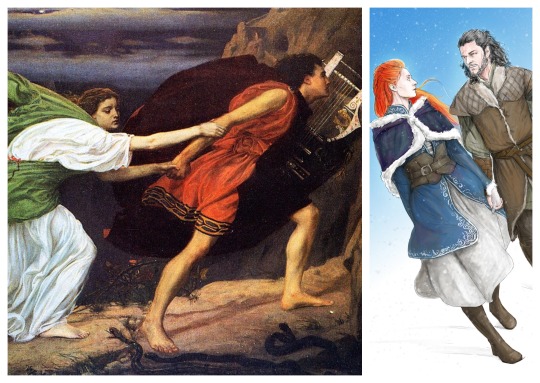
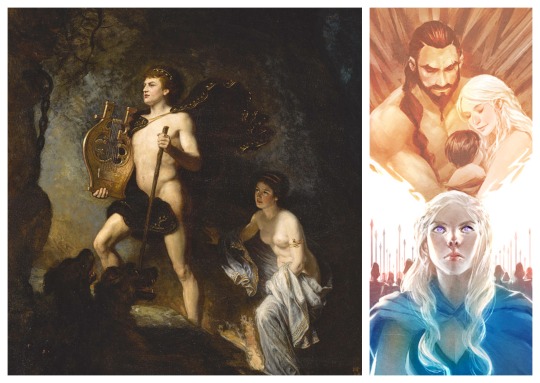
As always, another premise, no these fantastic artworks are not mine, I merely collect them on internet to make the whole meta more aesthetically pleasing, so credit to the artists and if any would like their art removed because reasons just let me know!
But, this on the art I must say, I chose these four pieces for a very particular reason, also displayed by the quotes I've chosen to parallel and also the order in which they are put is significant and I will discourse on a bit as of why.
First raw, we have Orpheus and Eurydice by sir E.J. Poynter (some of you may have guessed it) which I chose for the colors, I know I said gender swapped, so Orpheus is supposed to be Sansa and Eurydice Jon, but it does hold interest that Orpheus here is shown with dark hair and the colors of House Targaryen, red and black, paralleling visually Jon whilst Eurydice has reddish hair and wears the colors of House Stark, white and green, doing the same for Sansa; also with the detail of them holding hands (which I will return to shortly) and besides it a lovely Jonsa piece in which Sansa looks back at Jon and holds his hand beneath a gentle snowfall.
Second raw we have Orpheus and Eurydice by Emil Neide in which Orpheus is shown facing the three headed dog of Hell (Cerberus) with his harp set aside, and a staff in his hand, he faces forward with intent and determination (doesn't look like a man about to be overcome by impatience and feelings) whilst Eurydice follows almost completely naked half in shade. This piece gave me a very strange vibe I would no expect of this myth because Orpheus looks determined and conquering (especially with the addition of that staff in his hand) and there is no physical touch whatsoever between him and Eurydice, almost like love is not foremost, not like the power of this man facing off the three-headed dog (again with the three headed imaginary — three headed dragon, the symbol of House Targaryen and the three cities Daenerys conquers on her campaign east after Drogo dies) which is why I have chosen the piece besides it for Daenerys in which she's shown conquering and determined whilst she thinks of her lost dream of sitting on the IT with Drogo and Rhaego. They gave me the very same vibe, so to speak (also it's important the lack of physical contact between Orpheus and Eurydice in Neide's painting with the quote I've chosen for Daenerys which is also the same one which makes the whole connection between Daenerys and Drogo and Orpheus and Eurydice believable.
First things first, let's speak about queen Proserpine and her look-alikes in these two different version of contextualization of the myth in asoiaf.
Proserpine, queen of the Underworld ~ Melisandre of Asshai and Mirri Maz Duur, priestesses
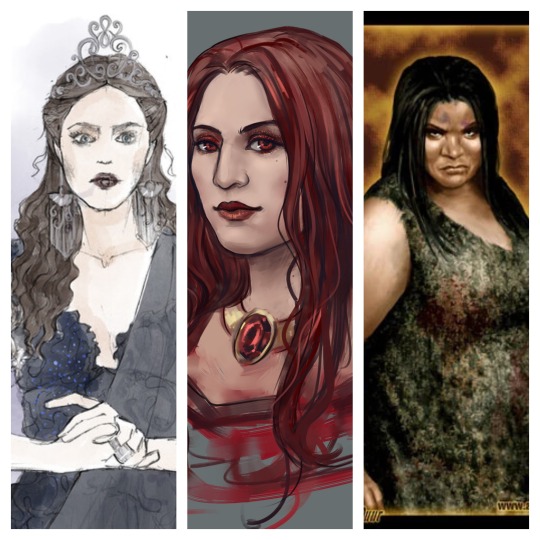
The art of Proserpine (first one to the left) is from the costume concept of queen Proserpine by Anna Biagiotti, from Monteverdi's “Favola d'Orfeo” .
But if the destinies refuse my vow,
And no remission of her doom allow;
Know, I’m determin’d to return no more;
So both retain, or both to life restore.
— Ovid, Metamorphoses, the Myth of Orpheus and Eurydice
Mirri Maz Duur sat back on her heels and studied Daenerys through eyes as black as night. "There is a spell." Her voice was quiet, scarcely more than a whisper. "But it is hard, lady, and dark. Some would say that death is cleaner. I learned the way in Asshai, and paid dear for the lesson. My teacher was a bloodmage from the Shadow Lands."
(...)
“I had to save him”
— GRRM, AGOT, Daenerys VIII
"I can show you." Melisandre draped one slender arm over Ghost, and the direwolf licked her face. "The Lord of Light in his wisdom made us male and female, two parts of a greater whole. In our joining there is power. Power to make life. Power to make light. Power to cast shadows."
“Shadows” the world seemed darker when he said it.
— GRRM, ADWD, Jon VI
It is very interesting that both in the contextualization for Drogo and Dany and Jon and Sansa we have a woman coming, or who has studied, in Asshai and that both use the shadow magic and blood magic taught there and there learned to resuscitate the gender swapped Eurydices.
I've already considered briefly the fact that every time a character is resurrected in asoiaf it seems there is a foreign who has learned the prayers and chants, and magics of Asshai and its magic involved:
Beric Dondarrion is resurrected by Thoros of Myr, a red priest
Lady Stoneheart is resurrected by Beric Dondarrion using the prayer and magic of the Last Kiss learned from Thoros
Drogo is kept alive by Mirri Maz Duur on insistence by Daenerys Targaryen, using magic she has learned from a shadow binder in Asshai
Daenerys Targaryen (yes this one is controversial but I have my theory about resurrection in asoiaf and Daenerys has been resuscited/born again in that fire and there is a reason for it) has learned from Mirri Maz Duur and is using the folklore talk she probably received from her brother to make the blood sacrifices required (I've spoken on it at length in this serie, so I won't digress on it beyond here)
Jon Snow, currently laying dead in a pool of his own blood and snow at Castle Black, where coincidentally is Melisandre of Asshai another red priestess (who is foreshadowed, by the show, to be the one performing the rite on Jon to resurrect him).
So, it comes to mind how there is always involved someone who knows blood magic, and dark sorcery from Asshai in whatever capacity (Thoros knows it as prayer, just as Mel does; Mirri Maz Duur calls it magic)
Now, in the myth of Orpheus and Eurydice the queen of the Underworld, Proserpine, whose heart melted by the young's grief coupled with her husband's sadness at his story convinced both deities to grant Orpheus to take back his wife to the land of the living grieving on him the duty he would fail— not turning to look at Eurydice until they're out of the Underworld — a duty he was probably fated to fulfill from the very beginning.
Proserpine or Kore, or Persephone is a very layered figure and often the limits of each layer does not coincide perfectly with the one under it or above it, so to speak.
In various versions of the same myth the deities of the Underworld are either well disposed to Orpheus or mocking of him and ‘true’ love and Proserpine sees the throne at the centre of this matter, wether she and her husband offered genuinely Orpheus his wife back or presented to him only her shadow and deceived him and set him up to fail. It is said that Hades wept and she felt her heart melt for Orpheus grief, but in other version, both deities are mocking of Orpheus and his attempt to deceive them to get back his wife, promising his life when he would not give it.
Proserpine herself is the goddess of spring and queen of the underworld thus she reconcile in herself two worlds apparently inconciliabile. This dualistic nature is persevered in the asoiaf form she takes both as Melisandre that as Mirri.
As goddess of spring she is goddess of rebirth and all new lives, she is a creational power in a way as goddess of fertility as well; as queen of the underworld she is an unyielding force not be trifled with, often more ruthless than her own husband from whom she enjoyed intriguing autonomy.
[In some versions of this very myth she's the one who grants Orpheus the allowance to leave the Underworld with his wife and imposing of him the duty not to look back to her... her duality is even more starkly clear when we think of the way she disposed of Theseus' friend who tried to steal her from Hades, and ended up by her own idea, permanently fixed on a seat in the Underworld, forever unable to move even an inch.]
This duality she has, and in some ways the influence she enjoys on her king, is without doubt completely filled by Melisandre, to a lesser degree by Mirri Maz Duur.
Melisandre of Asshai is a foreign — in the same way as Proserpine is a foreign to the Underworld — woman (who has suffered terrible abuse and has been sold as a slave, who never once enjoyed enough freedom) who has enchanted Stannis Baratheon, her king, and on whom she exercises a great deal of influence. Melisandre is shown capable to dispose of enemies thanks to her dark sorceries and blood magic and create the shadow of a life to forward her goals but as she often repeats she has the power to both unmake life and make it. This duality is basically the same one recognized to Proserpine especially if we consider the degree of influence Mel enjoys on Stannis — as men around consider her, his red woman and true queen — with the degree of freedom and autonomy Proserpine had in her duty as Hades' queen.
We've seen her plan for blood-sacrifices (Edric Storm) thus we know she is less squeamish than we'd like to use human sacrifice to reach her goals, in the same way, if we go by show canon (and considering she is the only one who could call Jon back to his body from Ghost presently) she will be the one to bring Jon Snow back to his unliving body, but in the text is often foreshadowed that Jon already is half a wildling, half a wolf and it's possible that his time spent in Ghost might make him return more beast than man and that it will be the influence of another to bring him truly back to himself. Give him his identity back when he has been returned back from death only functionally.
On the other hand, Mirri Maz Duur does not fit the bill as completely as Mel does. Mirri is a follower of the Great Shepherd who has enjoyed a great degree of freedom and has studied in all lands, also Asshai, and has learned not only healing science but also magic and sorcery and right now — after having enjoyed a great degree of wealth during her free life, she has been captured by Drogo in his quest to bring slaves to the slave cities to fund a campaign west to put his son on the Iron throne — is in the service of Daenerys Targaryen.
The duality though, is respected as Mirri Maz Duur is a woman of healing, she's a healer and a priestess herself of the Great Shepherd. Also, as I have discussed plenty in the serie linked above about Daenerys resurrection, she does not pose immediately as a threat to Drogo, she treats his wound and dresses it and tells them how to care for it only to see her care disregarded and unlistened to, after believing she might get her freedom back or live as a treasured woman in the service of the khaleesi (as Daenerys asks her to help her with the birth) and has been claimed as hers, is instead abandoned by Daenerys, left to be mistreated and abused and her resentment grows, still it is not her fault the dothraki do not follow her instruction pertaining Drogo and he is near to death. As she is a healer she also knows the dark sorceries of Asshai and employs them when Daenerys promises to free her if she saves Drogo, using a blood sacrifice to do so. When her time comes to be sacrificed she tries to reason with Daenerys, promises her expertise to help her to reach her goals using also dark sorcery.
Yet, why does one fit the bill completely, whilst the other not so much?
For one, Drogo does not die. He isn't resurrected by Mirri's magic, he is kept alive by Mirri's magic and that too at a price, at Daenerys own insistence and freedom.
Though she does parallel the fact that Daenerys is presented with a shadow version of her husband so much she demands to know when he will be as he once was, and Mirri gives her the famous speech of up-bending of the world for him to return to her.
Yet, Mirri is not the one with the power here. Daenerys is. This much Mirri tells her, herself. See what life is worth when you have nothing else. Drogo is the external representation of what Daenerys and her ambition to the IT have done to Mirri's own identity. She's not the one granting Daenerys to return back to the land of the living with her husband back as he was, she tells her from the beginning Daenerys will pay a price and Daenerys often wonders if she knew and didn't acknowledge it which is what spurns her even further.
On the other hand, Melisandre is the one with power and influence, we don't know the extent as to why she will resurrect Jon but it's possible she will do it because she has seen him fighting in her fires, that she thinks he might be instrumental in the Lord's Plan.
Jon, also technically, is not dead. To be more precise his body is dead, but his spirit has latched onto Ghost due to their bond, as it happens between warg and animal, yet it is possible that whatever rite Melisandre will celebrate will help his spirit return to his body. She'd been the one paving the way for his return to his body and its revival, if we go by book precedent she possibly will bestow on him the Last Kiss to purify him and that instead of simply cleansing him will bring him back to his own body and possibly rebirth him in the flame she'll breath in his mouth.
In conclusion, Melisandre seems to fit much better the bill than Mirri does when we think of the character from the myth they are supposed to cover from.
Eurydice, the Lost Spouse ~ Drogo and Jon, the dead and the living
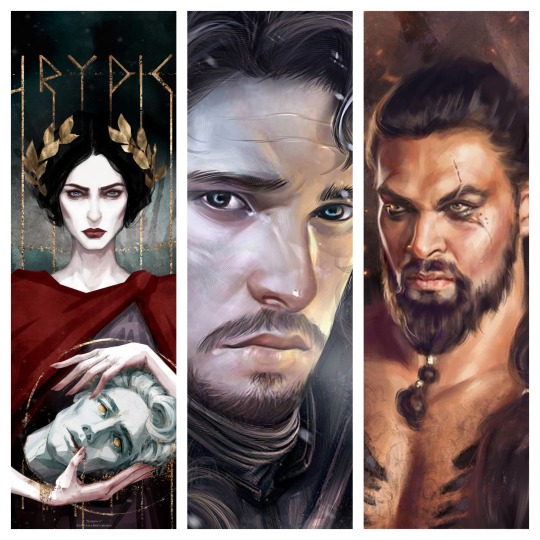
Again she dy’d, nor yet her lord reprov’d;
What could she say, but that too well he lov’d?
— Ovid, Metamorphoses, the Myth of Orpheus and Eurydice
When the third dagger took him between the shoulder blades, he gave a grunt and fell face-first into the snow. He never felt the fourth knife. Only the cold …
— GRRM, ADWD, Jon XIII
The birth had left her too raw and torn to take him inside of her, as she would have wanted, but Doreah had taught her other ways. Dany used her hands, her mouth, her breasts. She raked him with her nails and covered him with kisses and whispered and prayed and told him stories, and by the end she had bathed him with her tears. Yet Drogo did not feel, or speak, or rise.
And when the bleak dawn broken over an empty horizon, Dany knew that he was truly lost to her.
(...)
Never, the darkness cried, never never never.
— GRRM, AGOT, Daenerys IX
Actually when one looks at it, it's the exact opposite as to Drogo. Meaning that, both Jon and Drogo would in this interpretation fulfill the role of Eurydice (the dead spouse) only point is, because of the intervention of two very different entities they find themselves specular to each other:
Drogo's body is alive, but his spirit is gone or at the very least unreachable due blood sacrifice and dark sorcery — he doesn't speak, nor move, nor eat, nor drink unless helped and he does not interact with people; those around him collect infos about some facts about him (he likes to feel the sun on his skin, barely by observation) he is vegetative. This state is caused by the dark sorcery and blood sacrifice Mirri does on insistence of Daenerys, appealing to dark magic and blood sorcery.
Jon's body is dead, but his spirit is alive or at the very least reachable due to the intervention of the gift received by the Old Gods — he has warged into Ghost whilst dying, latching onto the bond they share, which ensues that his soul has not left the human plane to the beyond life yet, and he is still alive but trapped into Ghost's mind and body. Who has given Jon his bond with Ghost? The Old Gods, they are the entity that intervened to avoid Jon's absolute death. Indirectly or directly that they may have acted, in the text it's pretty clear Jon received Ghost by the Old Gods because as a prize for his selflessness in defending the Starks and he created the bond with him through them and it, thus at the very least indirectly they are the one that intervened to make sure he would be reachable and survive even if only in the capacity of staying into Ghost's body.
This (☝️) is why Jon fits better the bill of Eurydice if confronted with Drogo, whose body and soul remain connected and “alive, whilst unreachable”, while instead Jon, exactly like Eurydice, has seen his body dying but his soul is actually reachable and in a physically (Ghost) the same way as Eurydice's body is dead, but her soul is reachable physically in the Underworld.
In the myth Eurydice is a nymph who falls in love with Orpheus and who is loved in return by him. Their love has brief life, sadly, as the very day of their wedding Eurydice dies.
There are many versions of this myth, in some Eurydice falls in a nest of vipers (or steps on one) during a run from a satyr who, obsessed with her, tried to steal her from Orpheus; in others, instead, she's killed by Dyonisous maenads as they dance at her wedding, possibly because Orpheus had insulted the God.
One thing is very sure, her story represents the most famous myth pertaining Orpheus, though it might be one the last to be added to his name (but we will speak more of it, when we see the parallel between Orpheus, Sansa and Daenerys).
Now, thinking back on the way Eurydice dies, it seems to me pretty clear that Drogo doesn't fulfill the role as well as Jon does. Drogo dies because of his own doing, yes, he gains the wound that will kill him in a duel, due to his policy pertaining what his wife is entitled to, but if he had just listened to the instruction Mirri had given him he would not have suffered death. It is his own doing that is his fall.
And whilst Jon pays for his own doing, too, the very idea of the nest of vipers and he having stepped on it, or on just one, fits best with the reason why Jon is killed. In the show they make it look like Jon is killed because he let the wildlings through the Wall, that is not the case in the books, whilst the NW might be less than impressed with that, it's not Jon's doing, though there is his influence on the matter, it is the doing of Stannis and Jon is not held accountable of that, or better, that's not the pretense for which he is killed.
The reason why he is killed in the books is because, received Ramsay's letter, he decides to move with the NW to capture Winterfell from the Boltons and save whom he believes to be Arya in their clutches, unaware she is in fact Jeyne Poole and not his sister, breaking thousand of years of tradition of the NW not getting involved in the political matters of the Realm.
He, metaphorically, stepped on a nest of vipers of which he was very aware of — he was aware his politic would not be appreciated and that he was not appreciated as Lord Commander by all — unaware that it would bite back, or unaware of the extent they would go to, to impede his actions. He steps on several traditions, plunging people who are sworn off the Realm's matter, to a war they possibly cannot win.
It also fits with the fact that by destroying thousand of years of tradition, he is also breaking his oath to the Old Gods, in the name of whom he had vowed to devote his life to the NW and the enemy North. Was his death the Gods' punishment? The same way as Eurydice got killed in some version of the myth because Orpheus had insulted Dyonisous?
Also, do you know what the name Eurydice means in greek? It means wide justice and I do feel like it's fitting of Jon and in a wide way of the form of justice inflicted upon him (and her in the myth if we take in consideration the version in which she's killed because Dyonisous has been insulted) because he broke his oaths to the Gods actively and without turning back this time.
It certainly fits more with Jon than Drogo, also because we've seen Drogo taking, and taking and never once think of what is just, something that is not even contemplated in the dothraki way, as the dothraki way is that of the strongest eat the weakest. Instead justice and wide justice is integral part of Jon's arc. As lord commander of the NW he is the one administering justice at Castle Black, not only that, he is forever running after the very idea of what honorable Ned Stark would've done or wanted him to do.
He could give her a quick clean death, at least. He was his father's son. Wasn't he? Wasn't he?
— ACOK, Jon VI
The realization twisted in his belly like a knife. They had chosen him to rule. The Wall was his, and their lives were his as well. A lord may love the men that he commands, he could hear his lord father saying, but he cannot be a friend to them. One day he may need to sit in judgment on them, or send them forth to die
— ADWD, Jon III
And, tbh, I had not know prior to do this meta, but damn if it doesn't fit Jon like a glove, much better than it does Drogo.
So, yeah, I do think that whilst superficially Drogo may seem like he fits the bill to be a male counterpart to Eurydice that is not the case for the reasons stated above; Jon, on the other hand, seems to fit every little detail about the character down to the very point of having been killed, and effectively die to be then returned to the land of the living.
Also... this is mostly show-canon but yes, anyway, forgiveness is something deeply rooted into Eurydice's story, for she does not resent her husband in any way, because, she saw the love before the failing to bring it to completion. She saw proof of his love in his attempt, more than in his success. Especially if we consider that one of these instances happens when Jon and Sansa have to go their separate ways:
Sansa: can you forgive me? (...) forgive me.
Jon: alright, I forgive ye.
— GoT, s6e4
Sansa: can you forgive me?
Jon: the North is free thanks to you.
Sansa: but they lost their king.
Jon: Ned Stark's daughter will speak for them. She's the best they could ask for.
— GoT, s8e6
Eurydice, dying now a second time, uttered no complaint against her husband. What was there to complain of, but that she had been loved?
— Ovid, Metamorphoses
And I’d be the immediate forgiveness, in Eurydice.
— Talk, Hozier.
Yes, okay, heartbreaking, I am sorry....but it fits so well, it almost looks like it has been done on purpose (nothing to say in your defense, Martin?)
Orpheus the unconventional hero ~ Daenerys and Sansa, unconventional heroines of their story

(...)a single lyre
raised more lament than lamenting women ever did;
and that from the lament a world arose in which
everything was there again.
— Rainer Maria Rilke
“(...)A harp can be as dangerous as a sword, in the right hands.”
— Sansa VI, ASOS
"What if Lord Nestor values honor more than profit?" Petyr put his arm around her. "What if it is truth he wants, and justice for his murdered lady?" He smiled. "I know Lord Nestor, sweetling. Do you imagine I'd ever let him harm my daughter?"
I am not your daughter, she thought. I am Sansa Stark, Lord Eddard's daughter and Lady Catelyn's, the blood of Winterfell.
— Sansa I, AFFC
“I forgot, you've been hiding under a rock. The northern girl. Winterfell's daughter. We heard she killed the king with a spell, and afterward changed into a wolf with big leather wings like a bat, and flew out a tower window. But she left the dwarf behind and Cersei means to have his head.”
That's stupid, Arya thought. Sansa only knows songs, not spells, and she'd never marry the Imp.
— Arya XIII, ASOS
"But?" said Dany sharply. "Tell me. I command it."
"Prince Rhaegar's prowess was unquestioned, but he seldom entered the lists. He never loved the song of swords the way that Robert did, or Jaime Lannister. It was something he had to do, a task the world had set him. He did it well, for he did everything well. That was his nature. But he took no joy in it. Men said that he loved his harp much better than his lance."
"He won some tourneys, surely," said Dany, disappointed.
(...)
Dany did not want to hear about Rhaegar being unhorsed. "But what tourneys did my brother win?"
— Daenerys IV, ASOS
And saw her brother, Rhaegar mounted on a stallion as black as his armor. Fire glimmered red through the narrow eye slit of his helm. The last dragon, Ser Jorah's voice Whisper faintly. The last. The last. Dany lifted his polished black visor. The face within was her own.
— Daenerys IX, AGOT
And here comes the dissonant notes. Orpheus. The myth of Orpheus and his descent in the Underworld is one of the last added myths to his name, he is featured in the myth of the Argonauts as one of them and he was considered a deity (as he was the son of Apollo and a Muse) in Thrace.
Orpheus was also considered to be a prophet and his end was none to kind after he failed to save his own wife.
Now, both girls have the dragon-dream and the wolf-dream, Sansa keeps having wolf-dreams even after her direwolf, Lady, is killed. And both seems to be linked to magic whilst in different manner.
If ya don't believe in the power of manifestation, lemme just:
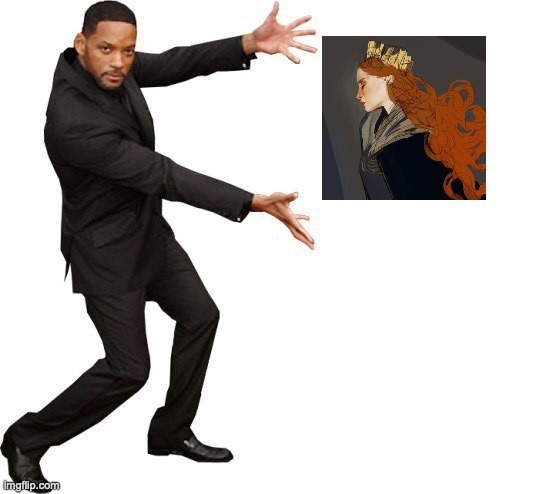
Sansa is THE queen of manifestation. Now, her wish and prayers may not always turn out the way she wants them (look at her wishing to become queen, and be loved by a golden prince *cough* Targaryen prince *cough* and ending up with Joff, to her praying for a true friend and knight and been subjected to Dontos and LF, but having Brienne coming her way, her wishing for a true friend to end up in LF's grasp but that also taking her to the Vale and to the Royces)
I'd not stand between Sansa Stark and something she prayed for, I tell ya.
Anyway digressing.
On the superficial level when one thinks of Orpheus they think of the sad, lost hero who descended in the Underworld, convinced Hades and Proserpine to let him recover his wife, but then, failed to get her to land of the living.
Yet, that is not all that Orpheus was. Whilst for Eurydice we know of her — as far as I have been able to find — only in relation to Orpheus, the same cannot be said for him.
To begin with in ancient Greece there was a whole cult called orphic based off prophets of which he was the legendary founder, a Thracian bard and poet he was also a potent prophet, an argonaut and the son of a God and a Muse.
As far as I have understood in ancient Greece, and possibly elsewhere as well, they had this idea that beauty of the exterior meant beauty of the interior, thus heroes were always beautiful and Orpheus is not an exception.
As for many of the myths we've spoken about, let's talk etymology first, just like Eurydice seems to mean ‘wide justice’, the meaning of Orpheus own very name is as layered and uncertain as the origin of his myth and legend.
In the end etymologists have concluded that his name's meaning spans over several planes:
hypothetically some them claims its etymology deriving from h₃órbʰos (meaning orphan, servant, slave) and ultimately the verb root *h₃erbʰ- (to change allegiance, status, ownership) which would configure him as someone who is under someone else's power and manages to change the boards in his favor and change status.
If we were to trust this etymology we'd conclude that both girls, Daenerys and Sansa, may parallel the meaning Orpheus' name seems to hold. Both of them, as I've previously stated, end up being powerless and at the mercy of others, but manage to change the odds in their favor thanks to their resilience, wit and unyielding strength of will. But, this is only one of the several etymologies for this name.
the most plausible etymology remains the greek one of ὄρφνη (órphnē; 'darkness') and and ὀρφανός (orphanós; 'fatherless, orphan').
Again, both girls do fulfill the bill completely or in part the bill of this etymology. Both are orphans and fatherless, and both feel very kneel the absence of the father — both of them style themselves after their fathers or what they know of them — until Daenerys learns the truth she thinks that she wants to make her kingdom beautiful and have her people smile at her as they did her father; whilst Sansa, as I've numerously affirmed is Ned moral heir and she parallels her own father so much. Both girls do, positively and negatively. Daenerys is impulsive and easily she goes for the neck instead of trying the diplomacy route, but I've said time and time again that that is not only due her own character but behavior she picked up by being around the people she ended up surrounded with (Viserys, the Dothrakis, Daario) to survive the trauma she endured.
Daenerys has certainly shown hints of her darker side already (the harrowing of Astapor, the torture of the wine seller daughters), whilst of Sansa's own dark side we've seen despairingly little (maybe because she is one of the purest characters of asoiaf world, which doesn't mean she's not stubborn, and naive or doesn't make mistakes based off impulsivity — just look at her and Joff and Cersei).
One of the few things which all storics seems to agree on is that Orpheus was a priest, in the polytheist sense of the term, he founded cults to Apollo and Dyonisus and he was the keeper of the orphic secrets as a seer. He was deeply involved into faith and religion, and on this matter I must say that only Sansa fits the bill.
Sansa knows the prayers to the Seven, as she has learned them from Cat and possibly her septa, but she also knows the Old Gods of her father and she's often shown praying, singing and chanting. It is an incredibly fundamental part of her own arc to the point that despite all she's suffered and suffering her belief remains steadfast:
There are gods, she told herself, and there are true knights too. All the stories can't be lies.
— Sansa IV, ACOK
And when she reaches the Vale, she feels like she is alone because there is not a Godswood with a Heart Tree there, and it seems like the Gods aren't even there.
Even the gods were silent. The Eyrie boasted a sept, but no septon; a godswood, but no heart tree. No prayers are answered here, she often thought, though some days she felt so lonely she had to try. Only the wind answered her, sighing endlessly around the seven slim white towers and rattling the Moon Door every time it gusted.
— Alayne II, AFFC
What is Daenerys stance of Gods? We never see her actively praying though I must say there are moments she must've done so, before it all begun or in the very beginning:
Yet when she slept that night, she dreamt the dragon dream again. Viserys was not in it this time. There was only her and the dragon. Its scales were black as night, wet and slick with blood. Her blood, Dany sensed. Its eyes were pools of molten magma, and when it opened its mouth, the flame came roaring out in a hot jet. She could hear it singing to her. She opened her arms to the fire, embraced it, let it swallow her whole, let it cleanse her and temper her and scour her clean. She could feel her flesh sear and blacken and slough away, could feel her blood boil and turn to steam, and yet there was no pain. She felt strong and new and fierce.
And the next day, strangely, she did not seem to hurt quite so much. It was as if the gods had heard her and taken pity.
— Daenerys III, AGOT
Tbh this whole thing points more imo, to her starting to humor the dragon in her, that relentless, fierce and scouring fire that she'll claim as hers, that she'll use to drawn strength from in her lowest moments but also unleash with her wrath whenever she feels justified about it.
But I can imagine young Daenerys completely overcome by the physical pain, begging the Gods to make it stop, to make her stronger and the dragon dream being her own mind conjuring a metaphorical reason as to why she was becoming stronger, making her identify with something she believes untouchable and undefeatable. The dragon.
But after she comes to Vaes Dothrak she starts to think of all Gods exactly the way the valyrians did before. They are there, perhaps, but not caring enough to show any sing of worship or respect.
She wondered what the Lamb Men had thought, when they first saw the dust of their horses from atop those cracked-mud walls. Perhaps a few, the younger and more foolish who still believed that the gods heard the prayers of desperate men, took it for deliverance.
— Daenerys VII, AGOT
"No," Dany whispered as tears ran down her cheeks. "No, please, gods hear me, no."
— Daenerys VIII, AGOT
What had she ever done to make the gods so cruel?
— Daenerys VIII, AGOT
This particular last quote is specular to a quote from Sansa herself, that on her wedding night to Tyrion after all she has endured thinks along the same lines, but the difference in phrasing, I believe, might be of importance.
But before that, Sansa herself is told more than once that gods are cruel, she herself wonder of it privately but always resolves that they aren't.
Tyrion turned to Sansa. "My lady, I am sorry for your losses. Truly, the gods are cruel."
Sansa could not think of a word to say to him. How could he be sorry for her losses? Was he mocking her? It wasn't the gods who'd been cruel, it was Joffrey.
— Sansa I, ACOK
And, again, during their wedding night:
This is not right, this is not fair, how have I sinned that the gods would do this to me, how?
— Sansa III, ASOS
See the difference between their mindsets resides in one simple word, Daenerys asks herself “what had she done” (as far as I know, but I am not a native speaker, so I may be mistaken, do is a neutrally connotated verb, it doesn't hold neither a positive nor a negative enforcement) whilst Sansa asks herself “how have I sinned” she uses the verb “sinning” which is negatively connotated.
She doesn't question that the Gods seems to be unfair, or not just, she questions in which way she might have sinned that she finds herself in this situation, whilst Daenerys plight is more outraged is more like “I've done nothing wrong in my life, why are you punishing me?” sort of thing. But again, I am not native speaker, so I may be mistaking the author intent here, still it strikes strange the one would sound so entitled and the other so modest whilst the sentiment behind the self-posed question is similar.
Let's turn back to Daenerys:
"My baby," she screamed, and perhaps the gods heard, for as quick as that Cohollo was dead.
— Daenerys VIII, AGOT
"It was her fate, Khaleesi," said Aggo.
If I look back I am lost. "It was a cruel fate," Dany said, "yet not so cruel as Mago's will be. I promise you that, by the old gods and the new, by the lamb god and the horse god and every god that lives. I swear it by the Mother of Mountains and the Womb of the World. Before I am done with them, Mago and Ko Jhaqo will plead for the mercy they showed Eroeh."
— Daenerys IX, AGOT
And whilst she believes the gods have sent her the comet to show her the way, she seems to slowly rise herself to their own peak, to the point that, when in Meereen she actually thinks as if she's one of them.
From here she could see the whole city: the narrow twisty alleys and wide brick streets, the temples and granaries, hovels and palaces, brothels and baths, gardens and fountains, the great red circles of the fighting pits. And beyond the walls was the pewter sea, the winding Skahazadhan, the dry brown hills, burnt orchards, and blackened fields. Up here in her garden Dany sometimes felt like a god, living atop the highest mountain in the world.
Do all gods feel so lonely? Some must, surely.
— Daenerys VI, ASOS
So, it sounds to me like peak difference between Daenerys and Sansa in their view of the Gods, and only one of them aligns with Orpheus. You guessed it, Sansa.
Now, Dany is convinced her dreams come true, and she's the one having visions in the House of the Undying. Does she have prophetic dreams? Or is she shaping her experience through the eyes of the dreams she makes?
Daenys the dreamer seems to have foreseen the end of Valyria and it seems that Aegon the Conqueror saw the enemy to the North, and if Martin is truly trying to tell us something Viserys' dream in HotD is clearly intended to describe Jon. So perhaps Dany does see specks of the future in her dreams and shapes her actions based on it.
Sansa's dreams, on the other hand, seem more focused on what she prays for. She prays for a champion and a friend, she dreams she calls for the knights of her stories who did not come to save her. Dreams for her, barred for the wolf-dreams she keeps having, seem to be a way to cope with what is around her more than about something that is about to happen.
I think Sansa's foretelling abilities are more in her daydreams, though she often dreams of Winterfell, of home, usually in her wolf-dreams. She dreams of children who look like her siblings. Those are her wishes coming to life in her mind through her dreams and I've already said about Sansa and the power of manifestation haven't I?
So, imo, whilst Daenerys' dream might be prophetic she shapes her whole life and actions on them instead Sansa's dream (save for the wolf dreams) are Sansa unconscious mind manifesting what she can no longer manifest openly. So, maybe Daenerys will get what she saw in her dreams — her being the last dragon, her dying at the fauces of a dragon, burned alive... as she may think she's immune to fire, whilst Martin has repeated several times that, that was a una tantum happening because of all the magic involved more than a fire immunity she doesn't have. She might be resistant, but I wouldn't be surprised if she ended up in fire at the end — because both of them are manifesting different things and shaping their lives after them. Daenerys conquest and fire and blood; Sansa's own childhood home, safe and sound and children who look like her siblings to remember them by.
So far, so, both girls seem to be on par to hold their part with Orpheus, but when speaking of the traits that make him, Orpheus....Daenerys surprising falls short.
It seems that Orpheus was not your average greek hero, it seems instead that he had inherited from his mother (a Muse) and his father in some myths (Apollo) the gift of music and poetry and that whilst Hermes might have created the lyre it was him who perfected it, some scripts say that it was Apollo himself that taught Orpheus to sing.
Before we delve into what people thought he could do with his gift, I must say this — it is tightly interwoven both with his religious figure and role as figurehead, as in the past more than today, religion and chants and hymns and songs were intertwined and expression of each other — his gift, in particular seems to take another connotation I seldom see spoken of. He's a great communicator, capable to communicate even with inanimate objects and ill-disposed toward him creatures, gods or people. His gift thus, is that of communication. Which he perfected so well he made of it a superior art, in a way so distinguished and powerful than even gods were powerless against it.
It is found written in poets as Simonides of Ceos that Orpheus's music and singing could charm the birds, fish and wild beasts, coax the trees and rocks into dance, and divert the course of rivers. Basically his communication was so good he seemed to have a magic hand with people, gods, animals, plants and even inanimate objects.
Now, though some call Daenerys charming, they often do that after she has become a powerful queen and conqueror, to take a leaf from Bilbo Baggins' book when she's a loaf of bread to be buttered very well to not get on her bad side, and boy does she have a bad side.
And, what of Sansa?
I have read once, and I reiterate (though I don't know who was OP of this genial take of her character) that the only thing we really should say about Sansa, which would say it all, is that she had a men-eating beast and she taught it to eat daintily from her hand and put a ribbon on her because manners are important.
Sansa is shown as capable of navigating an hostile court and use her charm to remain alive and at times to help others as well.
She convinces Joffrey not to execute Dontos, making up on the spot some kind of bad-luck omen in killing a man the day of one's nameday;
She convinces Joffrey not to have the woman with the dead babe killed but to give her coin instead (during a riot, nonetheless)
She manages to calm down a flock of scared women during the siege of KL, even whilst scared for her own life and without someone to look up to and to imitate in her pursue of being in charge of the ladies of the court.
"I will remember, Your Grace," said Sansa, though she had always heard that love was a surer route to the people's loyalty than fear. If I am ever a queen, I'll make them love me. — Sansa VI, ACOK
With her singing, whilst scared for her life and with a knife pointed at her throat, she manages to calm the Hound enough that even if he entered Maegor's Holdfast to rape her, kill her or take her with him he leaves her without hurting her further.
Tyrion himself watches her move around the court at Joffrey and Margaery's wedding and think that she'd make a good wife and a good queen if Joffrey had, had the sense to love her. Because thanks to her communication skills and courtesy she manages to be beloved even in an hostile court; to the point that while fleeting from Joffrey's murder she's told she's a kind lady, because she's crying after she saw the way Joff died.
Whilst posing as the bastard of a very hated man, she manages to fulfill the role left open by her aunt's death, becomes her cousin's primary caretaker and acts de facto Lady of the Eyrie. Lords and ladies respect her despite her apparent bastardy and her apparent parentage.
Also, signing can have another meaning as well. How many times have we heard it used in the sense of “making someone sing/tell the truth”?
“A harp can be as dangerous as a sword, in the right hands” LF says to Sansa and it's true, and Sansa is the one playing the harp. And it is reinforced when LF brings her to testify against Marillion and about Lysa's death and Sansa thinking on how the Royces should want truth and justice, more than whatever LF would offer them. I've said it many times — this foreshadows Sansa's journey with justice and how she is supposed to sing the truth — sings her stories (just like one of Varys' little birds) to the right ears to get LF under trial for his own doing and bring forth his demise in the same way her singing the truth about Joff to Olenna and Margaery spurned them to assassinate him.
And again, music and chants not only have a great deal of importance with religion, but also magic. Why, Mirri chants as she makes her sorceries and prayers and magic.
“Sansa knows no spells, only songs” followed closely with “and she'd never marry the Imp” makes me go all like...but she did marry the Imp forced as she was, so maybe she knows no spells but her songs works their magic, just as her communication skills do.
Sansa tells tales of valor, the same ones she once believed in, to Sweetrobyn in an attempt to make him feel more valiant, to make him act more honorable and she decides to surround him with valiants knights so that he may learn from their example, be loved by them and thus be protected. Just like a bard. And it works.
Sansa's own brand of magic, her communication skills works like a swiss-clock.
Now, this foreshadows directly with other specular pieces in Jon's chapters, creating a connection that despite Drogo and Dany being together and “in love” lacked.
Jon uses her communication rules in his daily life — telling Gilly her name is pretty to please her, as he cannot help her.
Jon sees beyond the Wall and he thinks that Sansa would be awed by the beauty of it like in a song, call it an enchantment and had tears in her eyes (in a similar situation, seeing snow for the first time since leaving home, Sansa acts in that exact same way).
When Jon is thinking of Winterfell, he sees his last memory of his sister, singing softly to herself as she brushed Lady's coat.
Poetic and prophetic as Jon is now in Ghost, a direwolf, sharing in his conscience, and we all think that, that might mean that when he is returned to his body he will take part of that ferality of the direwolf back with him, to enhance his own ferality. And what is, his last memory of Sansa? Her brushing Lady's coat — remember how Nymeria rebelled when Arya did the same? — whilst singing. Effectively charming a men-eating beast to be pliant and obedient to her.
Aww.... Jonny boy will you get all pliant and obedient too when Sansa comes around? After all you've been defending strenuously her claim to Winterfell, as strenuously as Arya's life when you choose to leave Castle Black to fight.
And why did I say, up above, in the beginning that it was important that Orpheus and Eurydice are shown holding hands?, with Orpheus leading as Sansa does in the piece I've chosen to parallel?
If you are familiar with my Jonsa-foreshadowing metas you might already be acquainted with what I think of Sansa building WF back up from snow and dawn stealing in her garden like a thief (flower = maidenhead; her garden — a thief stealing in her garden...stealing her virginity?; here), of her thoughts as she descends to the Gates of the Moon with Sweetrobin (here) and an entire series entitled “it's poetry, it rhymes” (x and xx) about Jon/Ygritte being only a decoy for Jon/Sansa (I swear I had no idea when I chose that title for those metas, but right now I'm starting to think it was because subconsciously I might had already gotten the vibe of Orpheus and Eurydice). And thus, you might already know where I am heading with the digression of hand holding.
So the excerpt of the text we want to look at, for this, can be found in Alayne II, AFFC, for some insight, Sansa has been hiding in the Vale for a bit as Alayne and she and Sweetrobin are making the journey down the Eyrie to the Gates of the Moon before winter hits and they get snowed in. Sansa is as scared as Robert is, but she shoulders on and braves on and lends some of her bravery to Robert by telling him stories of the Winged Knight.
“Ser Sweetrobin,” Lord Robert said, and Alayne knew that she dare not wait for Mya to return. She helped the boy dismount, and hand in hand they walked out onto the bare stone saddle, their cloaks snapping and flapping behind them. All around was empty air and sky, the ground falling away sharply to either side. There was ice underfoot, and broken stones just waiting to turn an ankle, and the wind was howling fiercely. It sounds like a wolf, thought Sansa. A ghost wolf, big as mountains. And then they were on the other side, and Mya Stone was laughing and lifting Robert for a hug.
“Be careful,” Alayne told her. “He can hurt you, flailing. You wouldn’t think so, but he can.” They found a place for him, a cleft in the rock to keep him out of the cold wind. Alayne tended him until the shaking passed, whilst Mya went back to help the others cross.
— Alayne II, AFFC
Wolf's howling is often considered a bad omen, but not for Sansa. Why? Because Sansa is a direwolf, she's a Stark, she identifies with a wolf and a Stark and how do wolves communicate? Howling.
The wolves howl to communicate with each other, especially when they are at great distance from each other, they do to communicate where they are, if there is a danger or if there is a prey which is why to a wolf, howling is a good sign, it means the others of the pack are alive, they are safe and that they are communicating something. To another?, a prey or an enemy? It means they are coming, and it’s not just one, it’s more than one. They are organising, they’re coming for you.
This particular excerpt is a foreshadowing of Jonsa, or Jon and Sansa working as a team. The ghost wolf as big as mountains refers to Jon, as his own direwolf is named Ghost, he is a literal ghost and one of his childhood memories is posing as a ghost in the crypts to scare his siblings; what more, Jon was born in the mountains of Dorne, at the tower of joy — thus only he can be the ghost wolf as big as mountains.
And, what is Sansa doing whilst Jon's presence looms so closely to her?
She is helping her cousin she takes him by the hand (*cough cough* the bride is handed to the groom *cough cough*) then she tends to him until his shakes passes; it seems to me that it foreshadows Sansa finding Jon in a clear fit after he returns from his “death” and warging in Ghost and she will tend him back to normality/life (or as normal as he will be after being resurrected)… sing him back to life, telling him stories of their father's honor and Robb's valor as well to remind him of home, to bring him back to himself (you know since her other cousin is comforted and calmed by music and her tales when he has his fits?)
Together she and her cousin face the perilous journey ahead (empty air and sky, the ground falling away sharply to either side. There was ice underfoot, and broken stones just waiting to turn an ankle— sounds like winter to me; wait *le gasp!* it is actually winter) and hand-in-hand they cross to the other side, where they are safe (back home in Winterfell and the North). That’s to me what that passage is hinting at.
So you see, it fits perfectly, like a glove, with the idea of Orpheus leading Eurydice by the hand, after his singing literally moved mountains and rivers and beasts — the three headed dog — and melted the will of the queen of the Underworld and of her husband granting him the boon he so much wished for. And what is on the other side? On the other side of winter it's spring, and I've said more than once that Sansa is not only the first child born in Winterfell but the only Stark born during spring as summer has lasted for nine years when AGOT begins and Sansa is eleven so she either was born during the last of winter when life starts to rewaken or in early spring with rebirth, whilst on the other side of death is life. Will Sansa show Jon back to spring and life in the same way as Orpheus brought Eurydice back to the threshold of the land of the living? It certainly seems so.
And what is one of Sansa most heartfelt traits? She remembers. She refuses to forget her father and her mother, her siblings. She dreams of them, she remembers them, she tries to do right by them.
As the northerners says “The North remembers” and remembrance is, sometimes, the only way to keep someone dead alive.
Before I delve into the last part of this meta, and the trope of failing to save a loved one, let's see the quote that would make you think Daenerys is the perfect Orpheus lookalike (wrongly, imo).
In another one of her dreams the “stars” supposedly tell her a secret, which is more of a warning in my opinion: «To go north, you must journey south. To reach the west, you must go east. To go forward, you must go back. To touch the light you must pass beneath the shadow.» so this sounds like a warning for her: look back or you will be lost. But what does Daenerys think about looking back?
If I look back I’m lost.
Which is a mantra for her, a mantra she started when everything went south with Drogo. Orpheus is charged not to look back before Eurydice has stepped into the land of the living again. It is because he is fearful, not hearing her steps behind him, that he does turn around in some version of the myth, in others he looks behind because he already stands outside the threshold of the Underworld and wrongly assumes she does as well whilst shielding her from the light of the sun which would've brought her back to life.
She (Dany) feels like she cannot look back at first when she learns of Rhaego's fate, and wonders if she truly knew the price to pay. Then again it happens when she kills Drogo, which also contains a bit of a spoiler for her end:
Inside the tent Dany found a cushion, soft silk stuffed with feathers. She clutched it to her breasts as she walked back out to Drogo, to her sun-and-stars. If I look back I am lost.
It hurt even to walk, and she wanted to sleep, to sleep and not to dream. She knelt, kissed Drogo on the lips, and pressed the cushion down across his face.
— Daenerys IX, AGOT
This is the moment she's lost forever to her dream of the little girl returning to the big house with the red door and the lemon tree. This is the moment, possibly, that in her mind starts her plan to sacrifice Mirri, Drogo and herself to the flames, putting the dragon eggs on Drogo's body.
Because as I have discussed at length her choice to make the blood sacrifice and what it entails (to which degree she understand it, it's unclear) is predetermined, it's deliberate. And it gives her the dragons in return. And possibly it started here.
And what does Daenerys do? She goes in the tent, takes a cushion with the intent of killing Drogo with it and then walks back out, in doing so she does look back. And as she herself says “if I look back I am lost”, she was lost in this moment in which she finally embraced the dragon quietly before the storm hit with the blood sacrifice.
What is back of her, her responsibility scares her, so she looks only forward. And it is a pattern:
she thinks it when she creates her khalasar before entering the pyre (again mention of death, her death and the blood rite, and the smoke and the fire) in Daenerys X, AGOT;
she thinks of it when she enters Astapor to buy the Unsullied (also because if she looks back she sees her following — people who stood by her through thick and thin — and think it insignificant) in Daenerys III, ASOS;
she thinks it again and again, every time she is faced with a choice she refuses to look back, to acknowledge her errors and learn, she just looks forward.
As long as she survives she has won, no matter the ruin she has left behind. She justifies the blood on her hand and does not look back (ADWD, Daenerys VII);
every time events should spurn her to look back she refuses because if she does she’s lost. Because to survive she has to keep walking (Daenerys X, ADWD) and if she looks back she doesn’t walk and she is lost.
At last when she embraces the dragon (while on the run with Drogon) she sets on her decision to not look back (Daenerys X, ADWD).
To me this foreshadows that she will keep looking forward and the moment she looks back consciously (like they framed it in the show: when she is touching the Iron throne and looks back beyond her shoulder to Jon who will kill her) is the moment she’s lost, might be she will realise the destruction she has brought and what she has become, just before dying (a depth the show failed to deliver to us, probably also because of the shortness of the last season coupled with the lack of the inner dialogue from the characters).
Instead what is Sansa's mantra? To be brave, as brave as a Stark, as brave as her lady mother and her brother and as brave as a lady from a song.
And she is.
Orpheus failing ~ the trope of failing to save a loved one

Or bid the soul of Orpheus
silfn notes as warbled to the
string,
Drew Iron tears down Pluto's
cheek,
And made Hell grant what
Love did seek.
— John Milton
Tyrion reclined on an elbow while Sansa sat staring at her hands. She is just as comely as the Tyrell girl. Her hair was a rich autumn auburn, her eyes a deep Tully blue. Grief had given her a haunted, vulnerable look; if anything, it had only made her more beautiful. He wanted to reach her, to break through the armor of her courtesy.
— Tyrion VIII, ASOS
No," she wept, "no, please, stop it, it's too high, the price is too high." More stones came flying. She tried to crawl toward the tent, but Cohollo caught her.
Fingers in her hair, he pulled her head back and she felt the cold touch of his knife at her throat. "My baby," she screamed, and perhaps the gods heard, for as quick as that, Cohollo was dead. Aggo's arrow took him under the arm, to pierce his lungs and heart.
— Daenerys VIII, AGOT
The trope of the myth of Orpheus and Eurydice is that of failing to save a loved one. Orpheus manages when none other did, he enchanted Cerberus and made Hades cry with his grief, melting also Proserpine's heart with his mourning and love for his wife. His music was able to move rivers and mountains and enchant animals and beasts and yet, humanly he fails the only human task given to him. Have faith.
It is because he is afraid they have deceived him, paranoid even, that he turns around before the time, setting Eurydice to return to the land of the dead nothing more than a shade.
Sansa and Daenerys both share, in AGOT, the struggle with failing to save a loved one. Sansa tries her best to convince Joffrey to grant he father pardon and send him to the Wall, exiled but alive; whilst Daenerys is ready to sacrifice everything to keep Drogo alive and at her side.
Both fail.
Sansa loses Ned and her innocence.
Daenerys loses Rhaego and her innocence. She later kills Drogo herself.
Yet, after this moment their roads take completely different turns and whilst Daenerys often rethinks about Drogo and what happened to him and Rhaego she slowly is become paranoid, afraid of being deceived and uncertain of whom to trust.
Sansa, on the other hand, keeps finding herself in the same situation over and over. Despite her attempts at diplomacy Robb wages war, gets named KitN and Sansa pays the price for every victory he gains, despite her prayers both him and her mother are killed, as well — to her knowledge Rickon and Bran — Arya is nowhere to be found and Sansa is all alone.
She manages to save Donto's life from Joffrey, but ends up unable to save him from LF.
Now, she's struggling for power in the Vale against LF, unawarely or awarely that she is doing it, and the point of contention is lord Robert whom she is protecting where LF is using him.
Just as his grief makes Orpheus more convincing, it seems like grief makes Sansa more beautiful to someone's eyes, and whilst I disagree with Tyrion, I do think that all she's suffered because of her inability to save Ned emotionally has made her even more astounding as a character. Her unfailing kindness and gentleness, her softness despite all that hurt are enhanced by the fact that they remain intact despite it all, as poetically said in this passage:
A pure world, Sansa thought. I do not belong here. Yet she stepped out all the same.
— Sansa VII, ASOS
Having failed once does not hinder her from trying again and again. And it's not even her loved ones, or people she knows personally.
During the bread riots Sansa manages to convince Joffrey to throw the woman with the dead babe coin instead of ordering her death.
Despite failing to save Ned, Sansa keeps pushing, she keeps trying to help others, to save others. As I've said more than once, Sansa will most possibly manage to save Jon, bring him back to himself, but in doing so she might as well loose him.
Just like in the show, Sansa telling the truth about him is done to save him, to protect him; Sansa re-organizes the whole army of northerners in disarray and threatens to wage war on KL if Jon is harmed, she manages to gets him to be pardoned by the king even though it means he's exiled at the Wall... yet in doing so, she also looses him however temporarily that might be.
[Ask me again in ten years]
So, seeing all of this, I believe Sansa might manage to save Jon, she might manage that against all odds staked, but in doing so she might have to sacrifice (temporarily I hope) her chance to be with him.
And it's bittersweet and heartbreaking, especially if Jon acts out of love for her and their siblings as suggested by the show, protecting her in return and damning himself in doing so.
And what of Daenerys? Daenerys has lost her sun-and-stars, she's lost her brothers and her father and mother, and her son. She's gained the dragons, her children. And, as Illyrio Mopatis said:
"The frightened child who sheltered in my manse died on the Dothraki sea, and was reborn in blood and fire. This dragon queen who wears her name is a true Targaryen. When I sent ships to bring her home, she turned toward Slaver's Bay. In a short span of days she conquered Astapor, made Yunkai bend the knee, and sacked Meereen.”
— Tyrion II, ADWD
And, you know why I think Daenerys sort of died and got resuscitated during the events of Daenerys X, AGOT?
When the fire died at last and the ground became cool enough to walk upon, Ser Jorah Mormont found her amidst the ashes, surrounded by blackened logs and bits of glowing ember and the burnt bones of man and woman and stallion. She was naked, covered with soot, her clothes turned to ash, her beautiful hair all crisped away … yet she was unhurt.
(...)
Wordless, the knight fell to his knees. The men of her khas came up behind him. Jhogo was the first to lay his arakh at her feet. "Blood of my blood," he murmured, pushing his face to the smoking earth. "Blood of my blood," she heard Aggo echo. "Blood of my blood," Rakharo shouted.
And after them came her handmaids, and then the others, all the Dothraki, men and women and children, and Dany had only to look at their eyes to know that they were hers now, today and tomorrow and forever, hers as they had never been Drogo's.
As Daenerys Targaryen rose to her feet, her black hissed, pale smoke venting from its mouth and nostrils. The other two pulled away from her breasts and added their voices to the call, translucent wings unfolding and stirring the air, and for the first time in hundreds of years, the night came alive with the music of dragons.
— Daenerys X, AGOT
This is the moment, the moment Daenerys Targaryen, the dragon, the Mother of Dragons, the conqueror is born, and she is born after a blood sacrifice, after a dark sorcery rite. She is reborn in fire and blood.
And as the time goes on, we see less and less of the Dany we've barely known in the beginning of AGOT, the small girl for whom we feel sad. She becomes a conqueror, stepping on others freedom and lives in order to get to the Iron throne, to drink the wine of vengeance for the Usurper's skull (no matter that Bobby B is dead). Formally she frees only the slaves at the end of AGOT and Missandei, she buys the Unsullied, tells them they are hers and then overlaps the concept of freedom with that of dracarys, but she never formally frees them.
She can't look back, not because if she does she looses herself, but because she'd find that Dany, the small girl who loved her brother and her big house with the red door and the lemon tree and see she failed her. That small girl she could've made happy, had she taken her dragons, her khalasar and turned to Vaes Tolorro, made the earth beautiful and alive again.
Instead, the chants, the song she is associated with is neither of prayer, nor of kindness or gentleness. It's the song of dragons and dragons plants no trees. And the more we see of her journey during ADWD, the more we see how her communication skills grow lesser and lesser, how she starts to depend more on the dragon, embraces it, when she sees that diplomacy tastes like defeat on her tongue.
Daenerys Targaryen looses her communication skills in her journey, until all that will be left of her will be fire and blood, and then she will turn back and see she failed to give her inner child back her home.
Sansa Stark, opposite, gains and perfects her communication skills, she depends on them to stay alive, to get back home, to rebuild it from ashes and make it full of life again.
Yes, maybe both failed to save a loved (or several) ones, maybe both of them are fated to fail — Dany toward Drogo and Sansa toward Sansa — in the sense they will save them, but be separated from them. And it's bittersweet and heartbreaking, but, in conclusion I'd say Jon and Sansa fit the bill of parallels with Orpheus and Eurydice much more than Daenerys and Drogo do.
Daenerys to mourn her losses starts a conquest. Sansa to mourn her losses starts to rebuild her home and her family. Perhaps they are two faces of Orpheus... but tbh I feel like the purest form of the myth of Orpheus and Eurydice is better represented in asoiaf with Jon and Sansa, rather than Drogo and Dany because:
Daenerys does not fit the bill of parallel with Orpheus because his distinctive trait is communication and we see her loose it.
Drogo is not an Eurydice parallel, because he dies only after Daenerys has done her pact with Mirri, by her own hand.
Daenerys in her grief does not turn to creation — like Orpheus did, composing music and poetry even after he failed to save Eurydice — she turns to destruction, to conquest.
As opposed to Jon and Sansa, who, for now (I am sure proof will keep piling up, because these whole collection of foreshadowing and proofs comes before they even interact in the book!) are yet to share a single scene together in the books:
Jon's body is dead, his soul reachable (just as Eurydice) fitting the bill perfectly
the way Jon's killed is reminiscent of Eurydice stepping on a nest of vipers either to flee someone trying to steal her, or because the menaids were angered
Sansa fits perfectly the bill of Orpheus, her fundamental traits and we see her hone her communication skills and depend on them and use them for good.
Jon's presence looms in Sansa's periphery foreshadowing her nursing him back to himself after his ‘death’ and helping him, by leading him through winter and to spring (why, Sansa learns that Jon has made LC as she's in the Vale)
Jon's last memory of Sansa is of her managing her men-eating direwolf whilst singing to her and brushing her coat — foreshadowing of Sansa managing to tend him back from ferality after his prolonged stay in Ghost.
Sansa's arc and refusal to stop trying to saving the people around her.
Jonsa finishing arc in GoT with them protecting each other to the very end and it causing their separation (it is unclear if it is temporary or not, seems to be hinted at as temporary tho as Orpheus separation from Eurydice as he too will die one day and reunite with her in the Underworld)
So... yeah, it turned long — again — still, hope you enjoyed it! Thank you to all the lovely anons who forwarded their opinion, this meta would not have turn out this way without your input so thank you and I hope you enjoyed it! Do you agree? What do you all think of this?
Let's hear your opinions! As always sending all my love ~G.
You can find my other mythology essays here:
Cersei and Daenerys — Venus decoded
Sansa and the mythological figures she embodies (Persephone/Kore, Isis, Medusa, Gunnlöd, Psyche) — the Myth of Sansa Stark
Jonsa foreshadowing part VIII — Love and Psyche
Jonsa foreshadowing part IX — the story of Osiris and Isis
#jonsa#jonsa foreshadowing#the hag mythology essays#mythology essays#mythology of asoiaf#jonsa and mythology#jonsa mythology#sansa stark mythology#jon snow mythology#orpheus and eurydice#daenerys mythology#drogo mythology#greek mythology and the world of ice and fire
38 notes
·
View notes
Text
Ist von Klassikern der russischen Literatur die Rede, fallen stets die Namen Tolstoi, Dostojewski und Tschechow. Iwan Turgenjew, dessen Geburtstag sich am 9. November zum 200. Mal jährt, geht daneben als harmlos-gepflegte Nummer durch. Sein Werk gehört zum Besten, was die russische Literatur hervorgebracht hat.
…Turgenjew war exzellent vernetzt mit den Geistesgrössen seiner Zeit. In Paris traf er sich regelmässig in einer Runde mit Gustave Flaubert, Alphonse Daudet, Edmond Goncourt und Emile Zola. Mit Bettina von Arnim, Paul Heyse und Theodor Storm führte er Briefwechsel auf Deutsch. Aufgrund dieser kulturellen Flexibilität setzte er sich in Russland dem wohlfeilen Vorwurf aus, er wisse gar nicht, worüber er schreibe, wenn er die politische Situation in Russland kommentiere. Dostojewski riet ihm sogar boshaft, sich ein Fernrohr anzuschaffen. Möglicherweise war aber auch einfach nur purer Neid im Spiel. Turgenjew wurde im westeuropäischen Literaturbetrieb zum Gatekeeper. Sein Urteil entschied darüber, welche russischen Werke übersetzt wurden…
0 notes
Text
A poem by Gregory Orr

Orpheus and Eurydice
They’ve just made love
in a clearing in woods.
She dozes lightly,
naked on the flattened
fragrant grass.
Orpheus
rises; he’s restless.
The way she lies there
it’s as if she’s already
dead - a sight he can’t bear.
And so, without knowing it,
he choses loss, the one
sure song.
She wakes in time
to see him turn
away and enter the dark
tunnel of trees, humming a tune
he’ll soon put words to.

Gregory Orr
Image: Orpheus And Eurydice, a painting by Emil Neide.
2 notes
·
View notes
Photo

Emil Neide (German, 1842 - 1908), Orpheus and Eurydice, n.d., oil on canvas, 59.125 x 43 in. (150.2 x 109.2 cm.)
47 notes
·
View notes
Photo
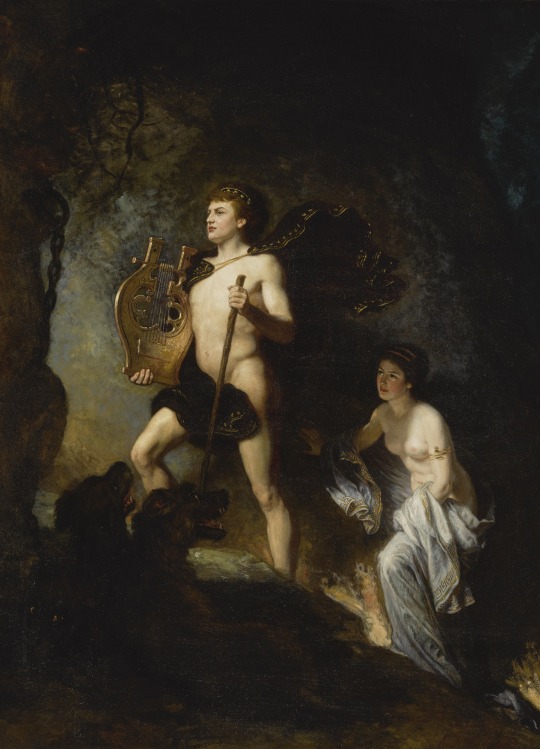
Emil Neide - Orpheus and Eurydice (undated).
0 notes
Text
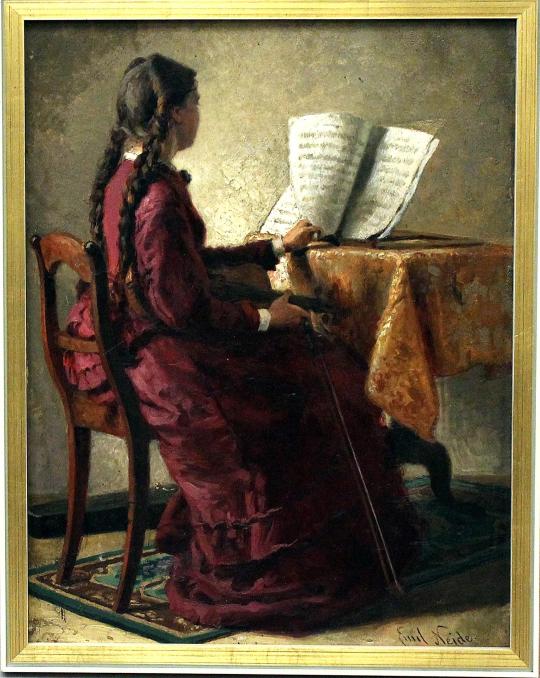
Emil Neide - Mädchen mit Geige beim musizieren (n.d.)
43 notes
·
View notes
Text
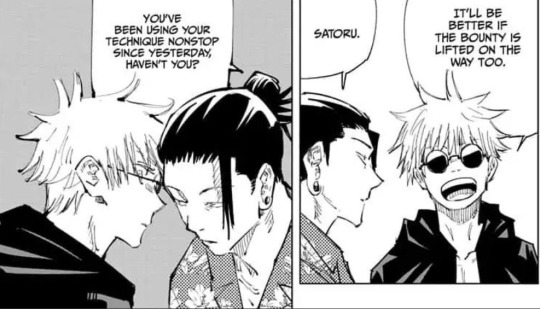




jujutsu kaisen ch. 70 / james blake – i'll come too / jujutsu kaisen ch. 90 / james blake – assume form / orpheus and eurydice (emil neide)
#yes i'm crying#again#just satosugu thoughts#head empty#jjk#jjk edits#comp#text#txt#textposts#jjk satosugu#satoru gojo#gojo satoru#gojou satoru#satoru gojou#getou suguru#suguru getou#suguru geto#geto suguru#art#emil neide#orpheus#eurydice#manga#orpheus and eurydice#mythology#greek mythology#james blake#jujutsu kaisen#music
27 notes
·
View notes
Text
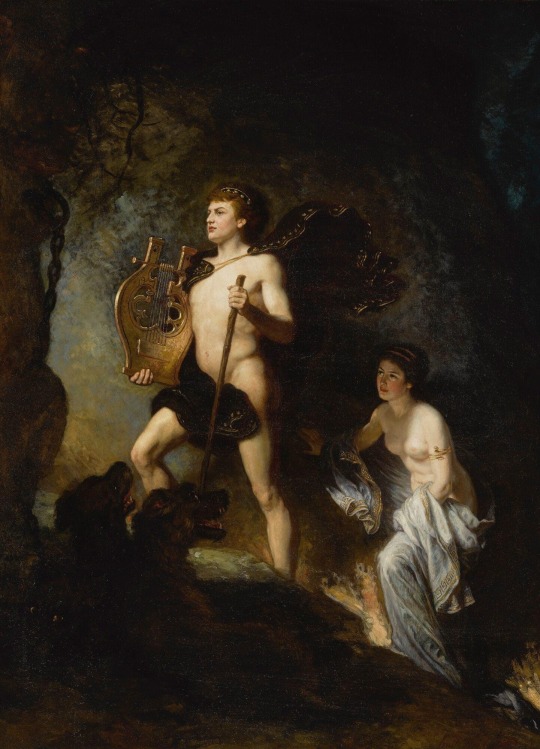
Emil Neide (German, 1842 - 1908)
Orpheus and Eurydice
oil on canvas
150.2 × 109.2 cm
Private collection
86 notes
·
View notes
